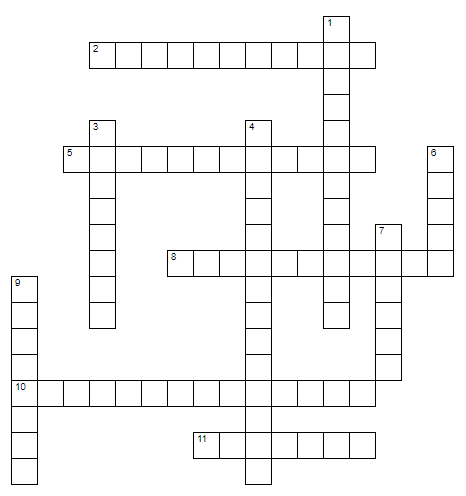
Challenge: Can you solve this puzzle even if you do not have the book by Kottak?

| ACROSS | ||
| 2 | Closed, hereditary systems of stratification that often are dictated by religion | |
| 5 | Association or covariation between two or more variables | |
| 8 | An exchange between social equals (who are normally related by kinship, marriage, or other personal ties) | |
| 10 | A position — negative or positive — tht is not automatic but has come through choices, actions, efforts, talents, or accomplishments | |
| 11 | A system of production, distribution, and consumption of resources | |
| DOWN | ||
| 1 | A permanent social group among non-industrial food producers whose members claim common ancestry | |
| 3 | The type of polygamy in which men have more than one wife | |
| 4 | The creation of separate social strata -- unrelated groups that differ in their access to wealth and power. The emergence of this phenomenon signals a transition from chiefdom to state | |
| 6 | A marital exchange in which the wife's family group provides substantial gifts to the husband's family | |
| 7 | A political leader in many societies of the South Pacific who is a regulator of regional political organizations | |
| 9 | Small-scale farmers who live in nonindustrial states and who have rent fund obligations | |
"Crossword puzzles were wonderful tools to review the reading material, especially at the end of the week." -- Bryan B., student
-- Howard Culbertson, hculbert@snu.edu
Phillip Kottak is a prominent anthropologist who has authored several textbooks on cultural anthropology. His work has focused on cultural variation, globalization, and the connectivity between culture and social institutions. He is known for his accessible writing style that makes complex anthropological concepts understandable to students and general readers alike.
Kottak has conducted field research in various parts of the world, including Madagascar and Brazil. His work has helped influence how anthropology is taught and understood in academic settings.